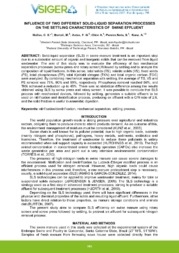Influence of two different solid-liquid separation processes on the settling characteristics of swine effluent.
Influence of two different solid-liquid separation processes on the settling characteristics of swine effluent.
Author(s): HOLLAS, C. E.; BORTOLI, M.; ANTES, F. G.; CHINI, A.; PEREIRA NETO, S.; KUNZ, A.
Summary: ABSTRACT: Solid-liquid separation (SLS) in swine manure treatment is an important step due to a substantial amount of organic and inorganic solids that can be removed from liquid wastewater. The aim of this study was to evaluate the efficiency of two mechanical separation processes (screw press and rotary screen) followed by settling and to analyze the composition of liquid fractions. In this sense, total solids (TS), volatile solids (VS), fixed solids (FS), total phosphorous (TP), total Kjeldahl nitrogen (TKN) and total organic carbon (TOC) were analyzed. By combining mechanical separation with settling, the average of TS, VS and FS removal was 75%, 80% and 69%, respectively. Phosphorus removal reached 86%, and TKN achieved a reduction up to 45%. There was no statistical difference among the results obtained using SLS by screw press and rotary screen. It was possible to conclude that SLS process with mechanical devices, followed by settling, generates a suitable effluent to be used on nitrification and denitrification process, producing an effluent with a C/N ratio of 2.6, and the solid fraction is useful to anaerobic digestion.
Publication year: 2017
Types of publication: Paper in annals and proceedings
Unit: Embrapa Swine & Poultry
Keywords: Dejeto, Desnitrificação, Efluentes, Metabolismo nitrogenado, Nitrificação, Suíno
Observation
Some of Embrapa's publications are published as ePub files. To read them, use or download one of the following free software options to your computer or mobile device. Android: Google Play Books; IOS: iBooks; Windows and Linux: Calibre.
Access other publications
Access the Agricultural Research Database (BDPA) to consult Embrapa's full library collection and records.
Visit Embrapa Bookstore to purchase books and other publications sold by Embrapa.

